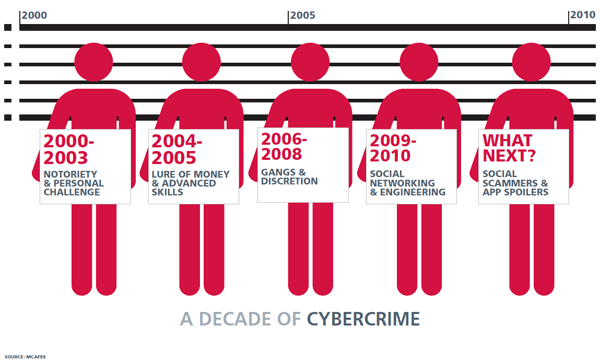U.S. Cybercrime Losses Doubled in 2008-2009 According to Internet Crime Complaint Center Report
The FBI (Federal Bureau of Investigation) supported Internet Crime Complaint Center (IC3) has reported that cybercrime losses in the United States have doubled from 2008 to the year 2009.
Cybercriminals are always exploring new ways to make money even if it means scamming hundreds of thousands to millions of computer users all over the world. We have always been certain that cybercrime is on a steady incline not only because of our own threat analysis, but because over the past decade other security experts have noticed an overabundance of new scamming trends.
Cybercriminal trends tend to have an expiration date but allow a hacker, or group of hackers, to ride it out until a better and more efficient way of exploiting computer users comes along. Just over the past decade, as demonstrated in the McAfee chart in Figure 1 below, there have been trends that lasted for only a couple years at a time from cybercrime being a 'personal challenge' to today's social scammers. Some of the most popular scams at one time during the past decade such as Nigerian scams, fake websites and scareware, all played a part in Internet crime and still do to some degree today.

Figure 1. McAfee's Decade of Cybercrime Trends Chart
Over the past two years, mainly from 2008 to 2009, cybercrime losses to consumers in the U.S. alone have doubled. This leads us to believe that the cybercrooks are exceptionally proficient at what they do and have recently become better. Then again, could it also mean that computer users in the U.S. have become more careless in their actions over the Internet or does our new social-networking era have something to do with it? Either way, whatever cybercriminals are doing behind that computer screen is working and we must be vigilant about overcoming their efforts.
How are cybercrooks today able to ramp up their efforts in such a way to cause the number of cybercrime losses to consumers to double in just one year's time? I will put it like this, when you encounter a road under construction you hardly ever drive on the demolished part but instead you follow the detour or navigate to an alternate route. Hackers are doing the same thing. For instance, just a week ago the Internet Crime Complaint Center noticed that cybercriminals were engaging in ACH-wire transfer fraud targeting businesses who were responding to emails inquiring about job opportunities. Not only does this signify cybercriminals doing something that is 'out-of-the-box', but it can be classified as a cruel and unusual to attack innocent computer users attempting to seek employment. Today's economy is bad enough as it is. The last thing we need are hackers attacking the unemployed and digging a deeper hole for them.
We do not know with 100% certainty what the future holds for new cybercrime trends. What we do know and can share with computer users today is, being proactive is probably the best way to avoid experiencing a great loss due to new malicious trends. That means utilizing resources that are readily available to detect malware on your system as well as staying in-the-know of the newest cybercrime trends. This can easily be accomplished by visiting our site and many other reputable computer/internet security resources over the Internet.